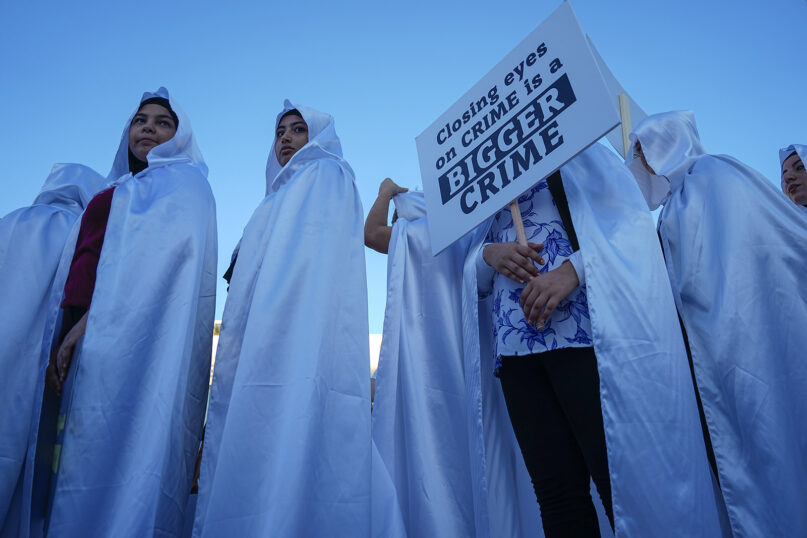(RNS) — Palestinian Christians living in Israel or the occupied West Bank have been facing a slow decline in numbers over the past few decades. In the first half of the 20th century, their numbers ranged between 20%-25% of the overall Palestinian population. Today, they are fluctuating between 1% and 2%.
Wars and conflicts have caused many to emigrate. The fact that they are generally located in the Jerusalem and Bethlehem areas, as well as the Nazareth and Galilee areas, has meant that they are generally in close touch with foreign tourists and pilgrims, relations that have fostered connections with Christian institutions — especially universities — abroad. Many have never returned.
The ascension of the most right-wing Israeli government in the history of Israel has made things worse for all Palestinians, but for Palestinian Christians the current regime has been a time of unprecedented attacks on churches, their leaders and their communities in Jerusalem and Haifa as well as cemeteries and other Christian locations. In addition, internal violence among Israel’s Arab communities has led to the death of some Christians since the beginning of this year through mid-July. Local leaders say Israeli police do little to stop this criminality.
Further poisoning the atmosphere is the Israeli government’s refusal to even negotiate about the fate of the occupied territories and the appointment of convicted racist leaders as ministers of police and finance. The mixture of religious Jewish fundamentalists with extreme nationalism has made life for Palestinians toxic and dangerous. Deaths among Palestinians at the hands of Israeli forces in 2023 have passed 200, among them 35 children.
In addition, the Religious Freedom Data Center, which documents attacks on Christians, estimates that since January 2023 at least 60 incidents of attacks against Christians have occurred. Christians in the Old City of Jerusalem, especially near New Gate and the Armenian Quarter, have been targeted by radical Jewish hooligans. Priests are regularly spat on. In Haifa a radical Hassidic community has been showing up in force to pray at the Stella Maris Monastery, claiming it is a Jewish site built on the remnants of the prophet Elisha and forcing local Christians and supporters to stand up to the Jewish pilgrims.
Meanwhile, bureaucrats in the government have frozen zoning decisions, preventing Palestinians from gaining official permits to build homes. Since 1967, churches have funded a few small housing projects that have also allowed Palestinian Christians to overcome the prohibitive cost of living in Jerusalem, but no major housing developments in East Jerusalem have been approved in that time. Meanwhile Jewish Israelis are entitled to government-subsidized mortgages.
When they build homes illegally, Israeli bulldozers knock them down, and the owners are sent a bill for the cost of the demolition. According to the Israeli human rights organization B’tselem, in May 2023 alone and on orders from the Israelis, 46 structures, including 30 homes belonging to Palestinians, were demolished.
There are other slights. Israeli legislatures have tried to ban Christians from sharing their faith under the guise of preventing “proselytization,” and Israeli Interior Ministry officials have barred evangelical Christian volunteers from obtaining a work visa. A video of an Israeli official banning a priest from accompanying the German minister of education to the Western Wall because he was wearing a cross has gone viral.
Lay people from the Latin church — the Christians who are in full communion with the pope — have been putting pressure on their leaders to speak out against the escalating attacks against Christians. Church leaders have been been making public appeals about the escalation of attacks on the churches and Christians to the Israeli government, which has been doing very little to stop the attacks. The protests have not changed official policy but have brought some relief.
In the Haifa case, media coverage and the advocacy of Palestinian Christians led to a visit by the Israeli president and the chief of police, which appears to have temporarily quieted the radical Jewish group.
While the situation looks dark for the tiny Palestinian Christian populations, many are doing their utmost to defend, protect and encourage Christian Arabs to stay put on their lands.
In Galilee, two Palestinian Christians, Botrus and Samar Mansour, and their spouses decided to renovate their grandparent’s home in the biblical village of Cana, where Jesus is believed to have turned water into wine, into a chapel for visitors. The Cana Wedding Chapel has attracted pilgrims and tourists wanting to renew their vows.
The uptick in tourism is helping such efforts, as tourists have flooded hotels and restaurants in Jerusalem and Bethlehem, providing Palestinian Christians with more money to overcome economic deprivation. But as with much in the Middle East, tourism’s effect is complicated, as the outmigration for education shows. Church leaders of all denominations have tried to fight the trend by setting up local higher educational institutions, including the Anglican Bir Zeit University, one of the best Palestinian schools, and the Catholics’ Bethlehem University.
It will be difficult to encourage the many Palestinian Christians who have emigrated to return, but the effort is underway to ensure that the tiny community stays put and has what it takes for sustainability.
But a longer-term fix would be to address the growing religious-nationalist threat, and sooner rather than later. The world community has supported Israel for decades by claiming that they have “shared values.” What is happening to Palestinians in general, and Palestinian Christians specifically, contradicts that claim.
(Daoud Kuttab is a Palestinian Christian journalist from Jerusalem and the former Ferris Professor of Journalism at Princeton University. The views expressed in this commentary do not necessarily reflect those of Religion News Service.)





